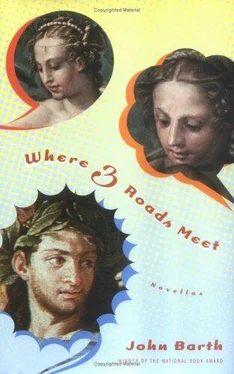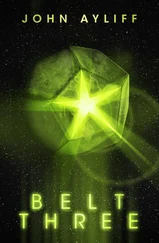Well: "I," for one, get dizzy just thinking about such things, and so while "Fred" was shifting our buggy's gears from first toward third, I took the opportunity to do the same with him, narrative-point-of-view-wise. It's still his been-told story being told, mind, and he's still It, but I'm telling you the sucker from here on out, at least this part of it/ slash/him; otherwise we'd all go around in such who's-in-charge-here circles that the three of us would likely keel over from narrative vertigo, and old Story's story'd disappear up its own asshole: a Mysterious Consummation for sure, but not likely the one Fred has in mind.
Indeed, while I've got the mike, so to speak, with your permission I'll just fill in a few blanks and maybe redo a detail or two? To begin with (excuse the expression), Mr. Hero-cycle-Driver's name isn't "really" either Fred or I. B. Told, any more than mine is "really" Isidore/Izzy/S.K./Et Al., except insofar as all of us turn into the stories that we tell ourselves and others about who we are. Which, no doubt, we all do, more or less. For while it may be true, as has been wisely said, that "the story of your life is not your life; it's your story," it's also true that our stories have "lives": They grow or shrink in their recollection and retellings; they add or lose details, whole episodes and characters even, as they age — and that's before we get to their ever-shifting slants and interpretations, by "ourselves" and others. Some are stillborn, some short-lived; others are all but immortal (not to say interminable), enjoying or anyhow living serial lives, multiple simultaneous lives, lives resonant with avatars and reincarnations…
But never mind all that, for now: A story that'll serve as Fred's and mine here in Part Two of "A Story's Story" happens to be that of——which, the way I tell it, goes something like this:
——'S STORY
Open any fair-size Anglo phonebook to the B's and you'll find a handful of entries last-named Blank. The word is, after all, just a from-the-French version of the more common English name White or German Weiss, with the added connotation, perhaps slightly negative, of that color's absence rather than its presence. In any case, one doubts that Blank, Dr. Shirley M., D.D.S. thinks of herself as any sort of absence, any more than Weiss, Stanley B., C.P.A. regards himself as particularly pale; most last names mean something, but most bearers thereof are indifferent to, if not ignorant of, such significance.
Name a Blank kid Phil, however, and he's in for trouble. Yet that's what Michael and Madeline Blank of State College, Pennsylvania, saw fit to dub their firstborn in the Eisenhowerian early 1950s: Philip Norman Blank, his first name Mike's late dad's, the second Maddy's née.
O comparatively innocent American time and place! Two cataclysmic world wars already history, the Korean War fought to armistice, and the Vietnam tarbaby only just beginning to attract U.S. fingers. The nation's traditional hard-liquor culture was in salutary mid-shift to wine, and although most folks still poisoned their lungs and others' with cigarette smoke even in college seminar rooms, such heavier-duty narcotics as heroin and cocaine — just beginning to be a problem in large-city ghettos — were all but unknown on American campuses and small-town streets, where even marijuana was uncommon. Redbaiting, witch-hunting, blacklisting, and loyalty-oathing there was aplenty, alas, in the same anticommunist political fever that piously inserted "under God" into the Pledge of Allegiance; the military-industrial complex flourished as Cold War supplanted hot, and the rest of the economy did all right too, though over everything hung the nightmare possibility that the U.S.-Soviet arms race could trigger nuclear apocalypse. But most Americans felt reasonably easy despite the new black-and-yellow Civil Defense signs on public buildings, the occasional neighbor's armed-and-provisioned bomb shelter, and vague though well-founded worries about radioactive fallout from atomic weapons testing.
No youngster, anyhow, was liable to lose sleep over such matters, especially at such remove as central Pennsylvania's Allegheny-nestled "Happy Valley," where the land-grant college after which the town was named (not yet a university in those days) turned out the commonwealth's next generation of engineers, foresters, agriculturalists, business administrators, "home economists," and schoolteachers in a farm- and forest-surrounded community whose chief employer was the ever-growing academic institution, and whose student population nearly matched its non-. A peaceful place, State College PA, except on football weekends: solid tax base, good public school system, and virtually full employment; no super-richies on the one hand and few dirt-poors on the other; enough input from faculty, students, and resident alumni to preserve it from acute small-town parochialism, and a freedom from urban problems that went far toward compensating for its geographical isolation and any lack of sophisticated big-city amenities. All in all, a good venue for raising children, and the Blanks — Maddy herself an elementary-school-teaching alumna of the college before and after her pregnancies, Mike a civil-engineering alumnus employed by the County Roads Commission — were more than content to raise theirs in its tranquil neighborhoods of laurel and rhododendron, its avenues of not-yet-blighted American elms.
Happy enough offspring of a happy enough couple, sturdy little Philip and baby sister Marsha, who came along two years later: like their parents, neither exceptional — physically, mentally, psychologically, or characterologically — nor deficient, except by comparison to the exceptional. No problems in the campus nursery school or the public school kindergarten; only in first grade did young Phil Blank's schoolmates, perhaps prompted by classroom exercises instructing all hands to Fill in the blanks, pick up teasingly on his name.
"They call me Phil-up the Blank!" he complained to his parents one brilliant late-September Saturday, as the family's "pre-owned" Oldsmobile wagon climbed through hem-locked hills toward a state-forest lakeside picnic. "And sometimes just Phil the Blank, like I'm not there! Billy Marshall calls me Phil N. the Blank! I hate them!"
Dad's advice: "Forget it, pal. Teasing's part of every schoolkid's routine."
"Just remember how it feels," suggested Mom, "if you're ever tempted to tease somebody about their name or appearance or whatever."
"Your first and last names both are names to be proud of, son."
Mock-indignant Maddy then, "Not the middle?"
"Middle too!" her husband amended, and patted his wife's near knee. "For sure!"
"Did Grandpa get called Phil-up and stuff?"
Speaking to his son's image in the rearview mirror, "Not that he ever mentioned."
And Madeline, with a knowing small smile at her spouse, "Grandpa Phil was never one for mentioning things."
Their son then and there decided "I hate my name!"
"No!"
"I hate my name, too," offered four-year-old Marsha, who until that moment had never thought about her name.
"No you don't." Mom. "It's a lovely name."
"Is not." But in fact, like most people, she had no particular feelings about her name — her first name, anyhow — but simply accepted it as hers. As for Blank, while Marsha would be spared the degree of schoolmate teasing about it that her brother was subjected to, she wasn't sorry to abbreviate it to a middle initial nineteen Septembers later, upon her marriage.
Young Phil, however — although by second and third grade his classmates' jibes had become mere idle reflex — found himself unable to shrug off the twinge of dissatisfaction he felt at every roll call, every form that required him to fill its Name-blank with his Blank name. Neither popular with nor disliked by his fellows, he did his best not only to blend in but to… not disappear, quite, but to draw as little attention as possible to himself and thus to his awkward name, which by fifth grade he was determined to change as soon as he became "his own man": perhaps when he left home for college? Even before then, when pupils from the area's several neighborhood and township elementary schools came together in Centre County Junior High and High School, he experimented with P. Norman Blank and Norman P. Blank —"Norm for short," he informed his classmates, entreated his parents, and threatened his sister. But while his new teachers and classmates readily obliged, and his family did their best, most of his old classmates either forgot or declined to use his new name, and a few explained the old tease to their new comrades. The unhappy result was more rather than less attention to the tender subject; by the spring of his freshman high school year he was, for the most part, back to being called Phil Blank.
Читать дальше












